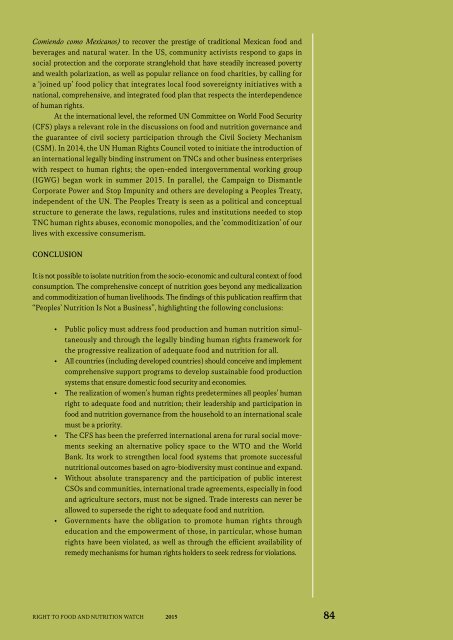RIGHT TO FOOD AND NUTRITION WATCH
1iNBHTY
1iNBHTY
You also want an ePaper? Increase the reach of your titles
YUMPU automatically turns print PDFs into web optimized ePapers that Google loves.
Comiendo como Mexicanos) to recover the prestige of traditional Mexican food and<br />
beverages and natural water. In the US, community activists respond to gaps in<br />
social protection and the corporate stranglehold that have steadily increased poverty<br />
and wealth polarization, as well as popular reliance on food charities, by calling for<br />
a ‘joined up’ food policy that integrates local food sovereignty initiatives with a<br />
national, comprehensive, and integrated food plan that respects the interdependence<br />
of human rights.<br />
At the international level, the reformed UN Committee on World Food Security<br />
(CFS) plays a relevant role in the discussions on food and nutrition governance and<br />
the guarantee of civil society participation through the Civil Society Mechanism<br />
(CSM). In 2014, the UN Human Rights Council voted to initiate the introduction of<br />
an international legally binding instrument on TNCs and other business enterprises<br />
with respect to human rights; the open-ended intergovernmental working group<br />
(IGWG) began work in summer 2015. In parallel, the Campaign to Dismantle<br />
Corporate Power and Stop Impunity and others are developing a Peoples Treaty,<br />
independent of the UN. The Peoples Treaty is seen as a political and conceptual<br />
structure to generate the laws, regulations, rules and institutions needed to stop<br />
TNC human rights abuses, economic monopolies, and the ‘commoditization’ of our<br />
lives with excessive consumerism.<br />
CONCLUSION<br />
It is not possible to isolate nutrition from the socio-economic and cultural context of food<br />
consumption. The comprehensive concept of nutrition goes beyond any medicalization<br />
and commoditization of human livelihoods. The findings of this publication reaffirm that<br />
“Peoples’ Nutrition Is Not a Business”, highlighting the following conclusions:<br />
••<br />
Public policy must address food production and human nutrition simultaneously<br />
and through the legally binding human rights framework for<br />
the progressive realization of adequate food and nutrition for all.<br />
••<br />
All countries (including developed countries) should conceive and implement<br />
comprehensive support programs to develop sustainable food production<br />
systems that ensure domestic food security and economies.<br />
••<br />
The realization of women’s human rights predetermines all peoples’ human<br />
right to adequate food and nutrition; their leadership and participation in<br />
food and nutrition governance from the household to an international scale<br />
must be a priority.<br />
••<br />
The CFS has been the preferred international arena for rural social movements<br />
seeking an alternative policy space to the W<strong>TO</strong> and the World<br />
Bank. Its work to strengthen local food systems that promote successful<br />
nutritional outcomes based on agro-biodiversity must continue and expand.<br />
••<br />
Without absolute transparency and the participation of public interest<br />
CSOs and communities, international trade agreements, especially in food<br />
and agriculture sectors, must not be signed. Trade interests can never be<br />
allowed to supersede the right to adequate food and nutrition.<br />
••<br />
Governments have the obligation to promote human rights through<br />
education and the empowerment of those, in particular, whose human<br />
rights have been violated, as well as through the efficient availability of<br />
remedy mechanisms for human rights holders to seek redress for violations.<br />
<strong>RIGHT</strong> <strong>TO</strong> <strong>FOOD</strong> <strong>AND</strong> <strong>NUTRITION</strong> <strong>WATCH</strong> 2015 84


